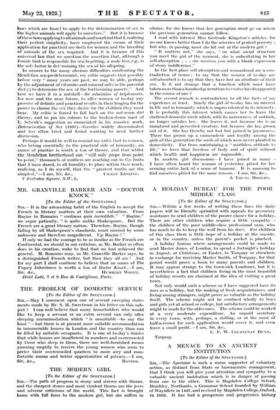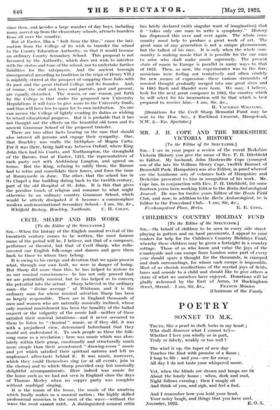A MENACE TO AN ANCIENT INSTITUTION
[To the Editor of the SPECTATOR.] SIR,—TIIC Spectator is such a warm supporter of voluntary action, as distinct from State or bureaucratic management, that I think you will give your attention and sympathy to a valuable ancient institution which is in danger of passing from one to the other. This is Magdalen College School, Brackley, Northants, a Grammar School founded by William of Waynflete in 1447, and revived by Magdalen College, Oxford, in 1802. It has had a prosperous and progressive history
since then, and besides a large number of day boys, including many moved up from the elementary schools, attracts boarders from all over the country.
But at Easter, like a " bolt from the blue," came the inti-
mation from the College of its wish to transfer the school to the County Education Authority, so that it would become
an ordinary County Secondary School. This proposal is not favoured by the Authority, which does not wish to interfere with the status and tone of the school, nor to undertake further liabilities for the ratepayers. And the ancient borough (incorporated according to tradition in the reign of Henry VII.) is mightily stirred at the prospect of snapping these links with its past and the great Oxford College and its founder. And, of course, the staff and boys and parents,. past and present, are equally disturbed. The reason, or, one reason, put forth by the College is that under the proposed new University Regulations it will have to give more to the University funds, and thus will have less to spare for its own institution. No one can accuse the College of lightly evading its duties or wishing to retardeducational progress. But it is probable that it has not thought out the effects on the beautiful old town and its ancient Grammar School of the proposed transfer.
There are two other facts bearing on the case that should also interest all persons and engage their sympathy. One, that Brackley was really the birthplace of Magna Carta. For it was there, being half-way between Oxford, where King John then had his Courts, and Northampton, the stronghold of the Barons, that at Easter, 1215, the representatives of each party met with Archbishop Langton, and agreed on terms. But the King, refusing to ratify them, the Barons had to retire and consolidate their forces, and force the issue at Runnymede in June. The other, that the school has in its Chapel a fine building dating back to the twelfth century, part of the old Hospital of St. John. It is this that gives the peculiar touch of religion and romance to what might otherwise be an ordinary country Grammar School, which would be utterly dissipated if it becomes a commonplace modern undenominational Secondary School.—I am, Sir, &c., Whitfield Rectory, Brackley, Northants. C. H. COLES.











































 Previous page
Previous page